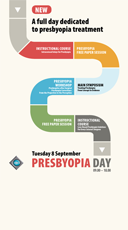Posters
(results will display both Free Papers & Poster)
Photorefractive keratectomy concurrent with accelerated cross-linking: safety and efficacy outcomes at 6 months
Poster Details
First Author: J.Reyes SPAIN
Co Author(s): F. Duch M. Marti R. Escude M. Crapanzano
Abstract Details
Purpose:
To assess the safety and efficacy of Photorefractive keratectomy (PRK) applied concurrently with Accelerated Crosslinking (CXL-a) in a group of miopic patients.
Setting:
Refractive Surgery Department,Institut Català de Retina(ICR), Barcelona, Spain
Methods:
Interventional case series at Refractive Surgery Department of Institut Català de Retina, Barcelona. Between June and December of 2014, a group of 10 patiens had PRK with concurrent CXL-a for treatment of myopia. The follow-up is 6 months by now.
The primary inclusion criteria were bilateral myopia or myopia with astigmatism, age older than 18 years, a BCVA of 20/20, and stable refraction. Corneal topography with no criteria of subtle keratoconus was also required.
The attempted correction ranged from -1.25 to -5.75 diopters (D).
Patients were examined preoperatively, 1, 3, 6, months postoperatively.
Results:
A total of 19 eyes of 10 patients were enrolled, with a mean age of 30.36 years. The mean preoperative spherical equivalent was -3,74D. The mean preoperative UCVA was 0.07 and the BCVA 1.0. The preoperative BFSp/BFSa (Efkarpides) ratio was 1.21 (normal) and the mean differential display Belin Ambrosio 0.67.
At 1-month follow-up the visual acuity values were 0.83 and 0.98 respectively. At the 3-month follow-up, values of UCVA and BCVA improved to 0.96 to 1.04.
No eye lost 1 or more lines of CDVA at the final visit. Data collection corresponding to the 6-month follow-up is being conducte.
Conclusions:
While CXL was designed for the treatment of keratoconus and ectasia, the use of PRK with concurrent CXL-a could help reduced the rate of regression of the treated ametropias. A new method to stabilize the patient's refraction and the cornea after refractive surgery would be very useful.
Financial Disclosure:
NONE





